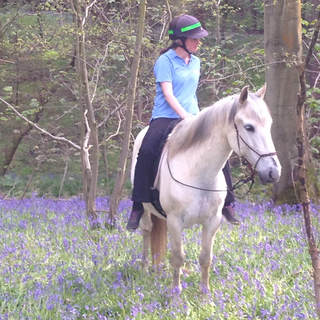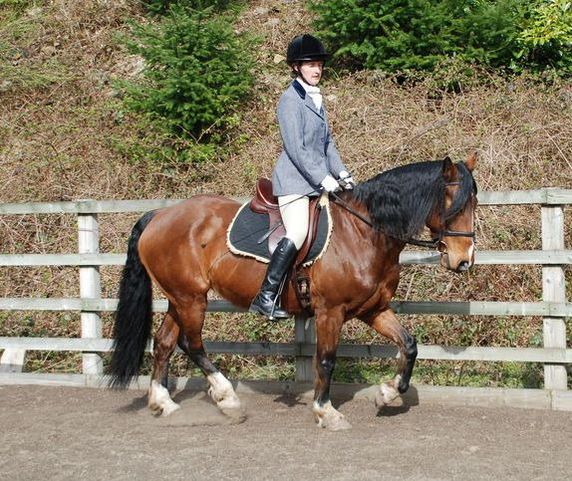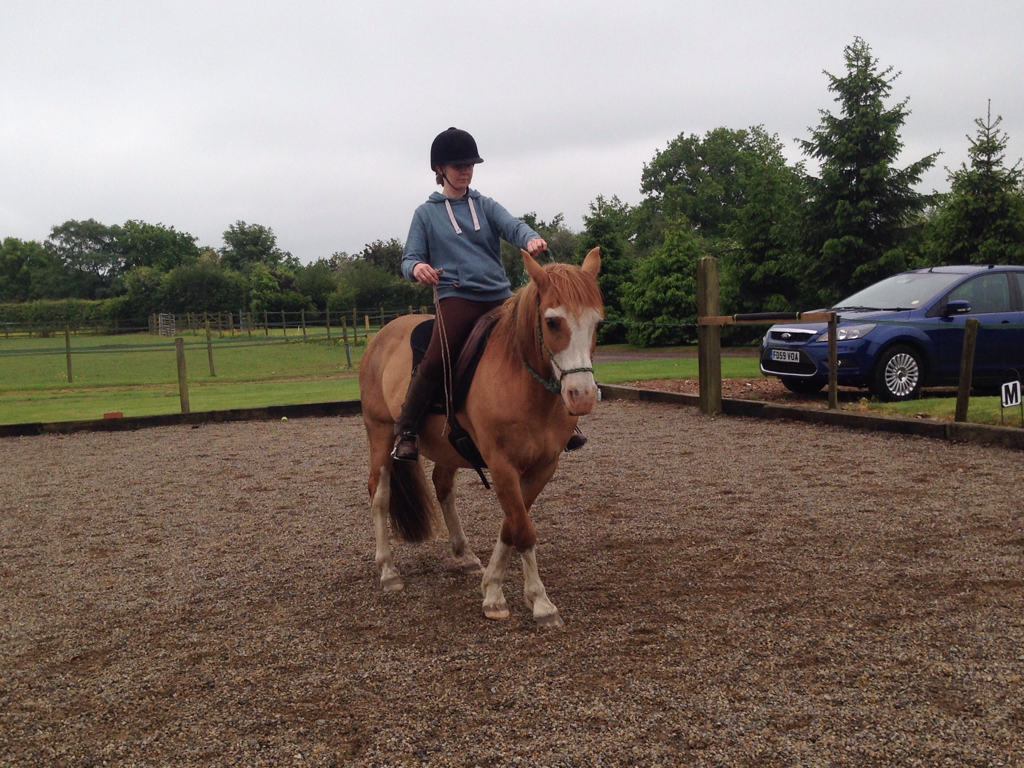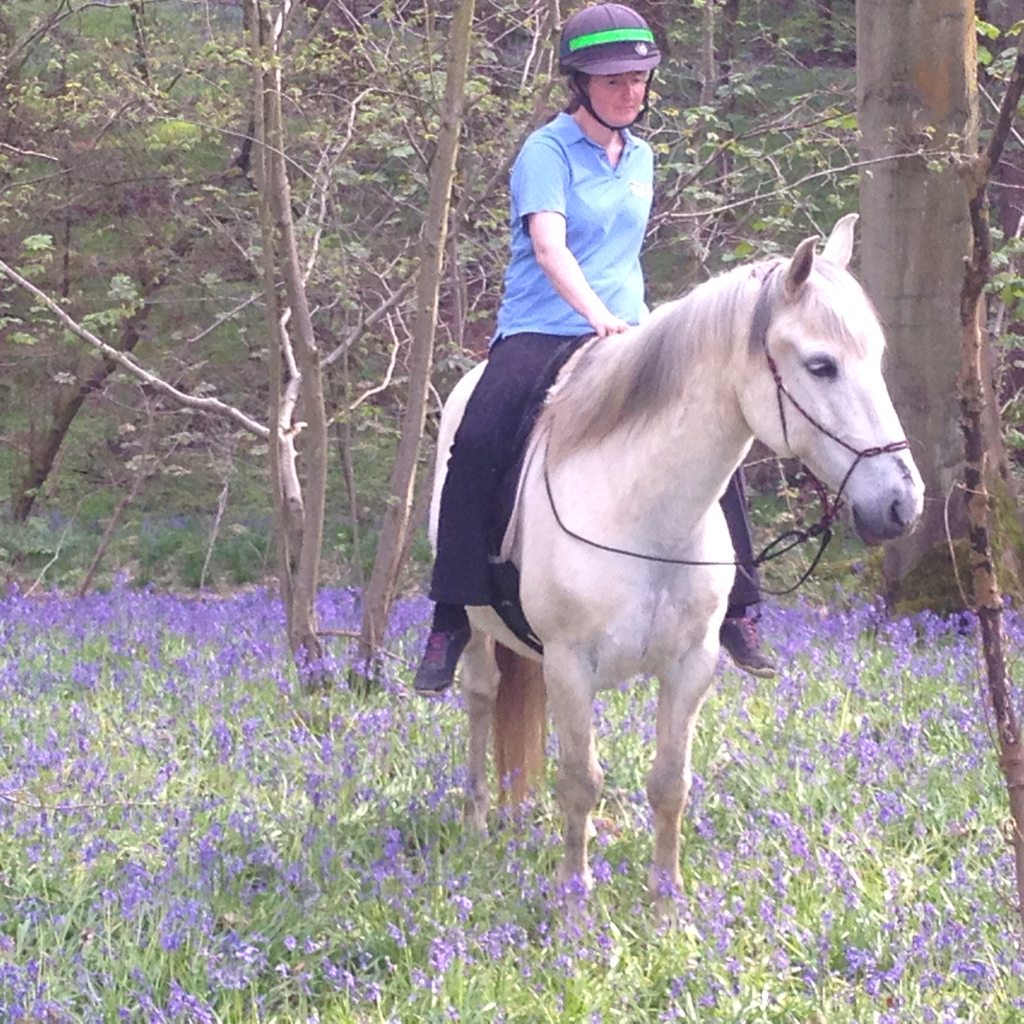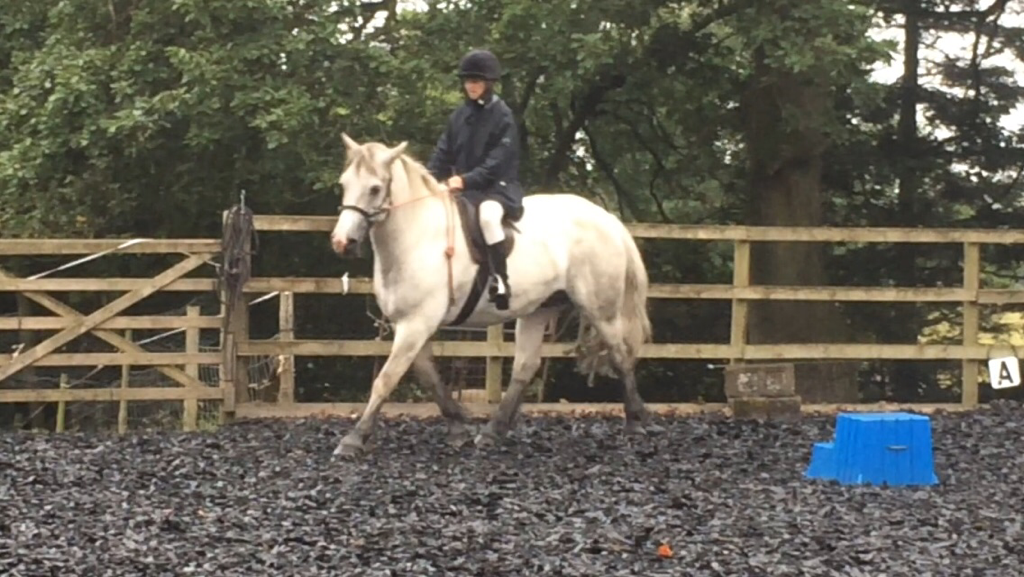So what is 'The Art of Feel'?The 'art of feel' is the expression I use to describe how to be aware, recognise, interpret all the physical. mental and emotional sensations both myself and the horse give and receive in an interaction and, in turn, how to use that knowledge to enhance training, rehabilitation (emotional and physical) and communication with our horses.
|
What is Art?
'Art is something that is created with imagination and skill and that is beautiful or that expresses important ideas or feelings.'
(Merriam-Webster Dictionary)
An integral part of good horsemanship comes from years of practice and development of skill but can be hugely enhanced by creativity and intuition. There is also nothing better than watching an incredible partnership between a horse and human, whether it's world class dressage, a liberty demonstration or even someone galloping joyfully across a beach. For horse lovers, these images conjure up emotion in us as much as a moving piece of music, a powerful dance or eloquent painting. And so I believe the is 'Art' within horsemanship.
The Merriam-Webster Dictionary's breaks down the definition of 'Art'
1. Art is a skill acquired by experience, study, or observation.
We all know that time, effort, determination to learn more is a lifelong process for horsemanship. Often the more we know the more we realise there is to learn. And it's not only learning about training because training is affected by health, nutrition, saddlery, trimming and shoeing, bitting, horse husbandry, our health, emotions and behaviour etc
2. A branch of learning:
I believe we can all learn 'feel,' int the context of horsemanship. I think we are all born with the ability to have great sensitivity. Upbringing, amount of time spent outside with nature and animals, freedom to express emotions, trauma (emotional and physical), encouragement or discouragement in being allowed to be sensitive, knowing how to learn with joy all impact our quality of 'feel.' I firmly believe that any' feel' that has been temporarily lost can be relearnt.
3. An occupation requiring knowledge or skill
We all know that horsemanship requires both knowledge and skill. 'Feel' is a transferable skill and helps handling other animal, working with people, body work and more.
4. The conscious use of skill and creative imagination especially in the production of aesthetic objects
Like dressage to music, a reining pattern, classical dressage, a beautiful bascule over a jump or just the effortless joy when you are totally connected to your horse whether training or riding through the forest.
5. (Archaic) A skillful plan
Which touches on the 'The Art of Feel,' a skillful plan to help you develop your 'feel.'.
(Merriam-Webster Dictionary)
An integral part of good horsemanship comes from years of practice and development of skill but can be hugely enhanced by creativity and intuition. There is also nothing better than watching an incredible partnership between a horse and human, whether it's world class dressage, a liberty demonstration or even someone galloping joyfully across a beach. For horse lovers, these images conjure up emotion in us as much as a moving piece of music, a powerful dance or eloquent painting. And so I believe the is 'Art' within horsemanship.
The Merriam-Webster Dictionary's breaks down the definition of 'Art'
1. Art is a skill acquired by experience, study, or observation.
We all know that time, effort, determination to learn more is a lifelong process for horsemanship. Often the more we know the more we realise there is to learn. And it's not only learning about training because training is affected by health, nutrition, saddlery, trimming and shoeing, bitting, horse husbandry, our health, emotions and behaviour etc
2. A branch of learning:
I believe we can all learn 'feel,' int the context of horsemanship. I think we are all born with the ability to have great sensitivity. Upbringing, amount of time spent outside with nature and animals, freedom to express emotions, trauma (emotional and physical), encouragement or discouragement in being allowed to be sensitive, knowing how to learn with joy all impact our quality of 'feel.' I firmly believe that any' feel' that has been temporarily lost can be relearnt.
3. An occupation requiring knowledge or skill
We all know that horsemanship requires both knowledge and skill. 'Feel' is a transferable skill and helps handling other animal, working with people, body work and more.
4. The conscious use of skill and creative imagination especially in the production of aesthetic objects
Like dressage to music, a reining pattern, classical dressage, a beautiful bascule over a jump or just the effortless joy when you are totally connected to your horse whether training or riding through the forest.
5. (Archaic) A skillful plan
Which touches on the 'The Art of Feel,' a skillful plan to help you develop your 'feel.'.
What is 'feel'?
Try looking up the definition of 'feel!'
One of the earliest definitions from the 17th century I could find is - feel is the 'sensation produced by something,' which covers it but ... there is so much more to it!
What I love is that 'feel' has the physical side of the definition
- 'to be aware of something or someone through touch' (Oxford Dictionary)
- 'to perceive through the sense of touch' (www.freedictionary.com)
- 'a sensation given by an object or person when touched' (google)
Essentially, 'feel' means the sensation of touching something else as much as it means the sensation given when touching or being touched. Immediately, this affirms to me that this one word, used across the board, in all spheres of equestrianism, captures the heart of horsemanship. There is a 'give' and a 'receive' of sensory information the moment there is an interaction between a horse and a person. Knowing this is one thing, understanding how to develop, access, understand and use the information we receive and give, is the essence of 'The Art of Feel' concept.
And there is more!
Feel also means:
- 'to experience an emotion' (google/Oxford dictionary)
- 'to be conscious of a physical, mental or emotional state' (www.dictionary.com)
- 'to be in a parcticular state as a result of an emotion of physical feeling (Macmillan Dictionary)
So there is so much more to feel than a mechanical touching of two animals. There is is also the possibility of both horse and handler/rider experiencing an emotion, of being made aware of either their own and/or the other beings emotional, mental and physical state, which in turn may effect change in the other beings mental, emotional and physical state. We have huge possibilities of interaction in a moment's touch.
One of the earliest definitions from the 17th century I could find is - feel is the 'sensation produced by something,' which covers it but ... there is so much more to it!
What I love is that 'feel' has the physical side of the definition
- 'to be aware of something or someone through touch' (Oxford Dictionary)
- 'to perceive through the sense of touch' (www.freedictionary.com)
- 'a sensation given by an object or person when touched' (google)
Essentially, 'feel' means the sensation of touching something else as much as it means the sensation given when touching or being touched. Immediately, this affirms to me that this one word, used across the board, in all spheres of equestrianism, captures the heart of horsemanship. There is a 'give' and a 'receive' of sensory information the moment there is an interaction between a horse and a person. Knowing this is one thing, understanding how to develop, access, understand and use the information we receive and give, is the essence of 'The Art of Feel' concept.
And there is more!
Feel also means:
- 'to experience an emotion' (google/Oxford dictionary)
- 'to be conscious of a physical, mental or emotional state' (www.dictionary.com)
- 'to be in a parcticular state as a result of an emotion of physical feeling (Macmillan Dictionary)
So there is so much more to feel than a mechanical touching of two animals. There is is also the possibility of both horse and handler/rider experiencing an emotion, of being made aware of either their own and/or the other beings emotional, mental and physical state, which in turn may effect change in the other beings mental, emotional and physical state. We have huge possibilities of interaction in a moment's touch.
And again there is more for the 'feel' enthusiast!
I particularly enjoyed the Merriam-Webster's collection of definitions too ...
I have used some of their definitions for a little dance with the concept of feel in horsemanship:
Feel: to handle or touch in order to examine, test, or explore some quality
- imagine the difference in the feel for our horse if each time we picked up contact onthe reins, rope or lungeline we thought about exploring the quality of the sensation rather than assuming we use the equipment to give a command.
Feel: to undergo passive experience of
eg. continually felt the resentment of his competitors
Think of those times when you have asked you horse something and you have listened and 'felt' something isn't right. I've seen a student's horse refuse to load and felt his emotions and we listened to this - I found out later the trailer ramp was disintegrating. Now think of those times when you have gone to the yard after a vile day at work and not centred before spending time with your horse - what passive experience would the horse have of our emotional state?
Feel: to have one's sensibilities markedly affected by
Again, this definition is a reminder to be aware of how we respond to our horse's behaviour, and how our behaviour can markedly effect the sensibilities of a horse. I have to remember when I'm teaching to find the neutral energy level for the horse and owner, Strong energy can be great for one situation and totally wrong for another - I aim to markedly effect the sensiblities positively (eg calm or joyful horse/owner) rather than negatively! (stressed/anxious/confused horse/owner)
Feel - - to be aware of by instinct or inference
An essential part of my coaching is to restore students' faith in their own instinct, or gut feeling I'm also aware that experience affects our instinct and know that the more someone handles a variety of horses with feel, the better their instinct becomes. I do find that most horse owners 'know' their horses. They also 'know' when something just doesn't feel right - this is when, as a coach, I feel it is essential to listen to the owner and find a way through it that 'feels right,' for that combination of horse/rider or get medical attention/saddler's/hoof trimmers etc input if appropriate, Instinct and gut feel is a huge part of good horsemanship that is often 'assumed' rather than discussed. Incredible horsemen and women can have trouble teaching a novice because they have gone beyond knowing consciously why or when they do something because it becomes totally instinctive. ('The Art of Learning is a great book describing how experience can create better instinct). Of course, 'feel' is a two way interaction so by developing a better understanding from the horse's perspective, based on their general instinct, their constitution and their past experiences, we can apporach training and handling more mindfully, with better feel.
Feel: to believe, think (say what you really feel)
I particularly enjoy this definition as horses are wonderful experts at seeing through our masks. We might be telling others or ourselves that we are confident, but the horses can feel straight through this. They also tell tales on someone who expresses a fear for a particular exercise (like a jump) but also would rather like to give it a go. Belief in oneself, your horse, the exercise you are trying to replicate and your trainer, whatever discipline or training style you choose to follow has a huge impact on how you communicate with your horse and obviously how you are able to use and interpret the other aspects of 'feel'.
Feel: to search for something by using the sense of touch
Eg. She felt in her purse for her keys.
I nearly left this one out and then I realised I liked the image of searching as part of feel - like the exploring and examining. As horses are prey animals, I think we also have to be aware than searching can turn into a 'hunting' for the correct movement or feel which, in turn can create a defensive response from the horse.
Feel: :to be conscious of an inward impression, state of mind, or physical condition
So often our lives become so busy and stressful that we end up in our heads and disassociated from our bodies. The idea that feel encompasses awareness of our inner selves and physically is so powerful. Much of the 'Art of Feel' came from a realisation that most of us have very limited connection with our body and emotion and how they interlink, despite exercise classes, meditation etc. After years of body awareness session and mindful movement of various kinds I am still in awe each time I discover a new sensation or subtlety of feel, I previously hadn't been conscious of. When I take this new bit of discovery into my horsemanship and allow it to flow into it, the results are always better. If we can't 'feel' what is going on for ourselves, how can we begin to know what type of feel we are giving or receiving a horse.
Feel: seem
Eg it feels like spring today
Again another I nearly omitted but it has an exploratory sense to the meaning which I like. When I get on Couscous it feels like visiting an old friend.
Feel: to have an inclination for
I'm sure we've all been on a horse where we've felt like doing something like a canter up the field and the horse picks up on it - or the horse feels like he wants to canter up the field! Again, this discussion is part of understanding and interpreting what is going on beyond the obvious, so we can develop the communication. We need to take responsiblity for giving and receiving information so we can not only keep ourselves and our horses safe, but also have a more invisible connection. The less aware we are of what a horse may have an inclination for, the more likely they are to follow through and take that canter up the field, or kick out or shut down. Also the less aware we are of realising we wanted something like the horse cantering, the more often a horse is remprimanded for behaving in a way that actually we asked for inadvertly - they were responding to a feel you gave, The horse felt the emotion before the physical act of asking him on and cantered off! In that moment we stop the action we have unintentionally asked for, we can reduce a horse's desire to feel back and dull them into needing more effective means for going and stopping. It also works another way. I have a mare and if I pick her feet up just thinking she might kick out, she does. She does have the inclination to (due to past history) but if I am honest with her, and have an expectation that she won't kick, and in return, I feed back to her that I will listen to her movement and not take her leg to a place that may hurt, she loses the inclination to kick out. There is a complexitiy of feel that goes on in that situation where I have to be mindful of what I give and receive and what she is giving and receiving.
Feel: to have sympathy or pity
Eg I feel for you
I think I prefer the concept of empathy but I like the sentiment in this - that good horsemanship includes being aware of how the horse feels too.
And there we have it - a whistle stop tour of various definitions of 'feel' and how this relates to feel in horsemanship!
Enjoy your own discoveries, develop your own theories on feel and share them with others!
I have used some of their definitions for a little dance with the concept of feel in horsemanship:
Feel: to handle or touch in order to examine, test, or explore some quality
- imagine the difference in the feel for our horse if each time we picked up contact onthe reins, rope or lungeline we thought about exploring the quality of the sensation rather than assuming we use the equipment to give a command.
Feel: to undergo passive experience of
eg. continually felt the resentment of his competitors
Think of those times when you have asked you horse something and you have listened and 'felt' something isn't right. I've seen a student's horse refuse to load and felt his emotions and we listened to this - I found out later the trailer ramp was disintegrating. Now think of those times when you have gone to the yard after a vile day at work and not centred before spending time with your horse - what passive experience would the horse have of our emotional state?
Feel: to have one's sensibilities markedly affected by
Again, this definition is a reminder to be aware of how we respond to our horse's behaviour, and how our behaviour can markedly effect the sensibilities of a horse. I have to remember when I'm teaching to find the neutral energy level for the horse and owner, Strong energy can be great for one situation and totally wrong for another - I aim to markedly effect the sensiblities positively (eg calm or joyful horse/owner) rather than negatively! (stressed/anxious/confused horse/owner)
Feel - - to be aware of by instinct or inference
An essential part of my coaching is to restore students' faith in their own instinct, or gut feeling I'm also aware that experience affects our instinct and know that the more someone handles a variety of horses with feel, the better their instinct becomes. I do find that most horse owners 'know' their horses. They also 'know' when something just doesn't feel right - this is when, as a coach, I feel it is essential to listen to the owner and find a way through it that 'feels right,' for that combination of horse/rider or get medical attention/saddler's/hoof trimmers etc input if appropriate, Instinct and gut feel is a huge part of good horsemanship that is often 'assumed' rather than discussed. Incredible horsemen and women can have trouble teaching a novice because they have gone beyond knowing consciously why or when they do something because it becomes totally instinctive. ('The Art of Learning is a great book describing how experience can create better instinct). Of course, 'feel' is a two way interaction so by developing a better understanding from the horse's perspective, based on their general instinct, their constitution and their past experiences, we can apporach training and handling more mindfully, with better feel.
Feel: to believe, think (say what you really feel)
I particularly enjoy this definition as horses are wonderful experts at seeing through our masks. We might be telling others or ourselves that we are confident, but the horses can feel straight through this. They also tell tales on someone who expresses a fear for a particular exercise (like a jump) but also would rather like to give it a go. Belief in oneself, your horse, the exercise you are trying to replicate and your trainer, whatever discipline or training style you choose to follow has a huge impact on how you communicate with your horse and obviously how you are able to use and interpret the other aspects of 'feel'.
Feel: to search for something by using the sense of touch
Eg. She felt in her purse for her keys.
I nearly left this one out and then I realised I liked the image of searching as part of feel - like the exploring and examining. As horses are prey animals, I think we also have to be aware than searching can turn into a 'hunting' for the correct movement or feel which, in turn can create a defensive response from the horse.
Feel: :to be conscious of an inward impression, state of mind, or physical condition
So often our lives become so busy and stressful that we end up in our heads and disassociated from our bodies. The idea that feel encompasses awareness of our inner selves and physically is so powerful. Much of the 'Art of Feel' came from a realisation that most of us have very limited connection with our body and emotion and how they interlink, despite exercise classes, meditation etc. After years of body awareness session and mindful movement of various kinds I am still in awe each time I discover a new sensation or subtlety of feel, I previously hadn't been conscious of. When I take this new bit of discovery into my horsemanship and allow it to flow into it, the results are always better. If we can't 'feel' what is going on for ourselves, how can we begin to know what type of feel we are giving or receiving a horse.
Feel: seem
Eg it feels like spring today
Again another I nearly omitted but it has an exploratory sense to the meaning which I like. When I get on Couscous it feels like visiting an old friend.
Feel: to have an inclination for
I'm sure we've all been on a horse where we've felt like doing something like a canter up the field and the horse picks up on it - or the horse feels like he wants to canter up the field! Again, this discussion is part of understanding and interpreting what is going on beyond the obvious, so we can develop the communication. We need to take responsiblity for giving and receiving information so we can not only keep ourselves and our horses safe, but also have a more invisible connection. The less aware we are of what a horse may have an inclination for, the more likely they are to follow through and take that canter up the field, or kick out or shut down. Also the less aware we are of realising we wanted something like the horse cantering, the more often a horse is remprimanded for behaving in a way that actually we asked for inadvertly - they were responding to a feel you gave, The horse felt the emotion before the physical act of asking him on and cantered off! In that moment we stop the action we have unintentionally asked for, we can reduce a horse's desire to feel back and dull them into needing more effective means for going and stopping. It also works another way. I have a mare and if I pick her feet up just thinking she might kick out, she does. She does have the inclination to (due to past history) but if I am honest with her, and have an expectation that she won't kick, and in return, I feed back to her that I will listen to her movement and not take her leg to a place that may hurt, she loses the inclination to kick out. There is a complexitiy of feel that goes on in that situation where I have to be mindful of what I give and receive and what she is giving and receiving.
Feel: to have sympathy or pity
Eg I feel for you
I think I prefer the concept of empathy but I like the sentiment in this - that good horsemanship includes being aware of how the horse feels too.
And there we have it - a whistle stop tour of various definitions of 'feel' and how this relates to feel in horsemanship!
Enjoy your own discoveries, develop your own theories on feel and share them with others!

